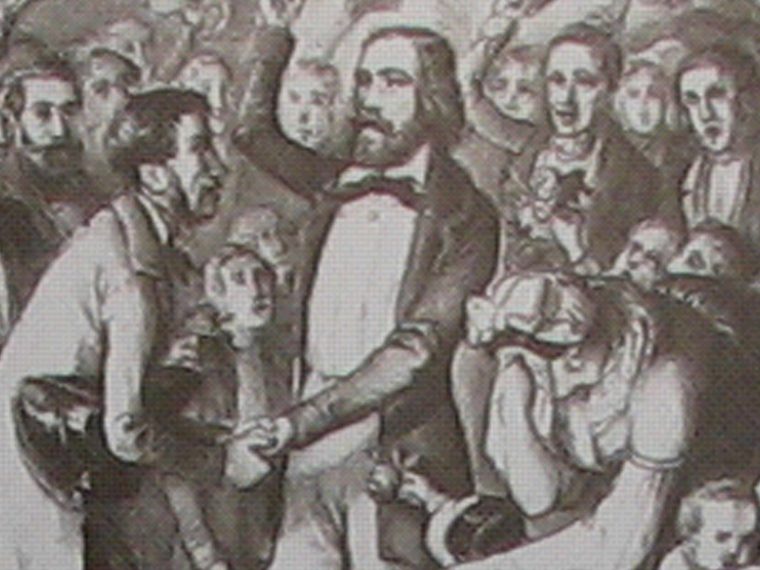History’s Encyclopédie subscribers are matched to grievances against the monarchy
Popular films and literature typically depict the French Revolution of 1789 as oppressed workers’ violent overthrow of a decadent and corrupt monarchy. Picture Madame Defarge knitting calmly by the side of the guillotine.
But a new study by Mara P. Squicciarini of Bocconi University, Italy, and UCLA Anderson’s Nico Voigtländer turns that romanticized view of French history on its head. Their research into the roots of modernization suggests that while angry peasants took to the streets, it was “enlightened elites” who drove the reforms that upended French society in the late 18th century.
The researchers single out scientists and other “knowledge elites” as crucial players in the institutional changes that led to the modernization of France’s feudal order.
Opt In to the Review Monthly Email Update.
A key part of their research draws from an extraordinary meeting that was called by King Louis XVI on the eve of the revolution. The Estates General was composed of 1,200 members representing three main pillars of society: the clergy, the nobility and the working class. The last group included peasants, workers, merchants and other professionals.
The representatives were asked to submit cahiers de doléances, or ledgers of grievances, with suggestions to improve society. Their responses touched on everything from corruption and unfair taxes to aristocratic hunting rights.
The king’s desperate outreach did not quell the growing anger among the long oppressed lower and middle classes, which soon erupted in violence. It also didn’t save the king and his wife, Marie Antoinette, from losing their heads in 1793.
But centuries later, those cahiers have helped academics better understand the forces behind the French Revolution and the societal transformation that followed.
Squicciarini and Voigtländer trace the roots of this rebellion to the Age of Enlightenment. This 18th-century movement, which preceded the revolution, brought a new type of scientific thought and philosophy to France, including democratic ideals such as liberty and religious tolerance.
The bible of France’s Age of Enlightenment was the Encyclopédie, an ambitious effort to classify all types of human knowledge in one easily accessible source. The book, which was initially published in 1751, is considered one of the first major dictionaries of the arts, sciences and crafts.
Squicciarini and Voigtländer use a list of Encyclopédie subscribers to determine where “knowledge elites” lived in France prior to and during the revolution. That data was then compared with the grievances that were lodged prior to the revolution.
They found that regions with a “thick knowledge elite,” determined by a higher subscriber density, were far more likely to support education for the masses and other tools of democratization, including freedom of the press and equal rights. In contrast, their data show that demand among lower social classes for these changes was “astonishingly small.”
Historically, the Catholic Church controlled primary education in France. Religious teaching dominated the curriculum with little attention given to reading or writing. Prior to the revolution, there was widespread resistance to mass education at the local level.
But after the monarchy was overthrown, the new government made free public education a priority, arguing that “children of all classes” should have access to knowledge to “elevate the soul and to render men worthy of liberty and equality.” That education provided the foundation for other dimensions of modernization, such as “state-building, progressive political views and social capital.”
Squicciarni and Voigtländer determined that the “thick knowledge elite” regions of 1777-79 had a higher percentage of schools per capita and higher literacy rates a century later, even after accounting for initial literacy rates. They also show a strong positive correlation between subscriber density and an increase in mutual aid societies and voting rates for the political parties that supported the revolution’s progressive ideals.
This research resonates strongly today, when globalization has hastened income inequality worldwide and “liberal elites” and science are increasingly touted as the problem rather than the cure, by anti-elites.
Squicciarni and Voigtländer challenge the argument by some economists that inequality hampers modernization by “favoring the development of institutions that entrench elites and restrict economic opportunities for the masses” (Sokoloff and Engerman, 2000). But they also point out that it is the quality of the elites, not simply the quantity, that matters.
Based on their findings, the presence of “enlightened elites” can encourage positive growth and democracy-building by fostering institutions that promote economic growth and encourage a more open society.
This is not the first time Squicciarni and Voigtländer have used the Encyclopédie to solve a historical puzzler. In a different parsing of that data published earlier, they found that “upper tail skills” — technical or scientific skills or interests, even if confined to a small group of elites — were as “crucial (to) innovation and diffusion of modern technology” during the Industrial Revolution as they appear to be today.
That research, which was published in the Quarterly Journal of Economics, also offers important lessons for community leaders seeking to jumpstart their economies. An investment in basic education provides overall benefit to society, but the key to growth lies in the engineers and other entrepreneurs whose specialized knowledge spurs innovation and technology adoption, thereby boosting productivity.
Featured Faculty
-
Nico Voigtländer
Professor of Global Economics and Management
About the Research
Squicciarni, M.P, & Voigtländer, N. (2016). Knowledge elites and modernization: Evidence from revolutionary France.





